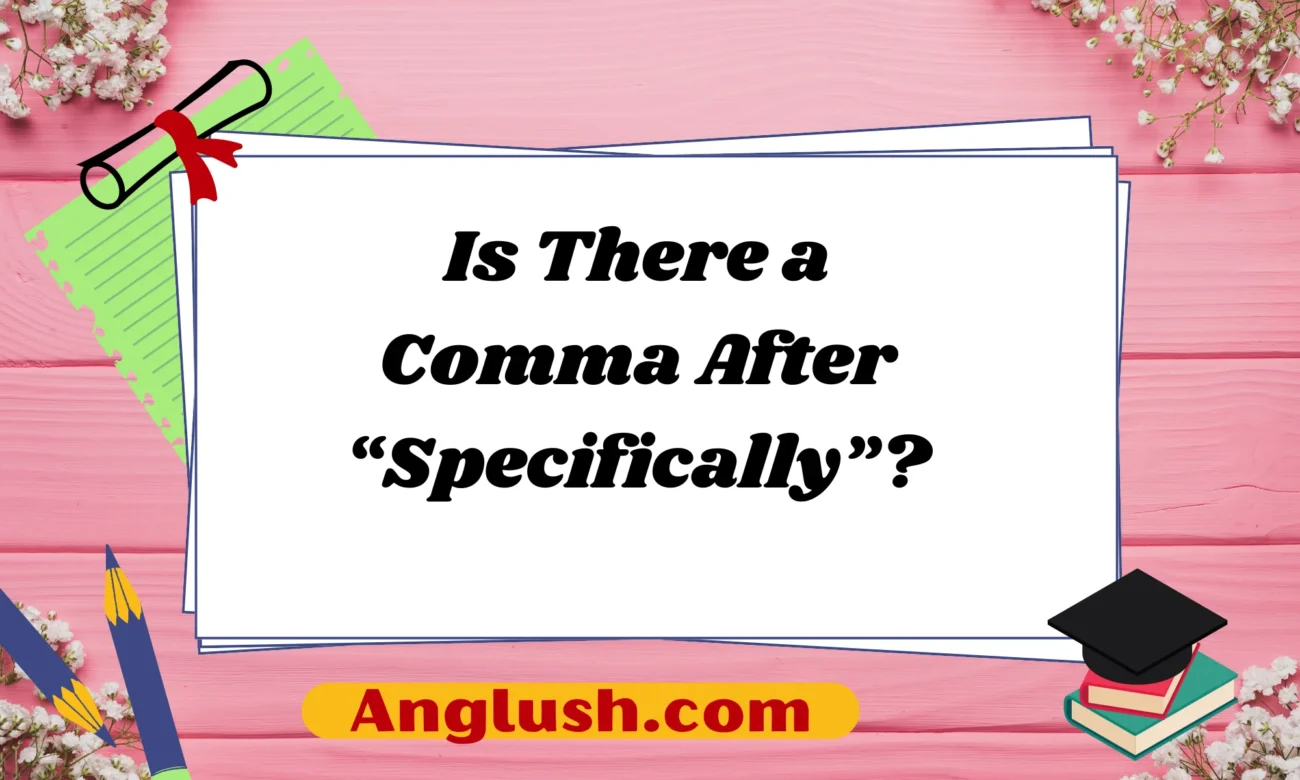Introduction
Punctuation plays a vital role in writing, affecting both clarity and readability. One common question that arises is whether a comma should follow the word “specifically.” The answer depends on how the word is used in a sentence.
This article will explore the different contexts in which “specifically” appears, whether a comma is necessary, and how sentence structure affects punctuation choices. We’ll also provide practical examples to help writers and speakers use “specifically” correctly.
When Should There Be a Comma After “Specifically”?
Whether a comma follows “specifically” depends on how it functions in the sentence. Let’s break it down into different scenarios:
1. When “Specifically” is Used as an Introductory Word
When “specifically” begins a sentence or clause, a comma is typically used after it. This follows the general rule of placing a comma after an introductory adverb to improve clarity and readability.
✅ Correct Usage:
- Specifically, I was referring to the second chapter of the book.
- Specifically, we need to address the budget concerns before moving forward.
In these cases, “specifically” introduces a thought, and the comma helps to separate it from the rest of the sentence.
2. When “Specifically” is Used Mid-Sentence Without Interrupting the Flow
If “specifically” appears in the middle of a sentence without creating a strong interruption, a comma is generally not needed.
✅ Correct Usage:
- We need to focus specifically on improving customer service.
- She was talking specifically about the marketing strategy.
Here, “specifically” functions as a standard adverb modifying a verb, so no comma is required.
3. When “Specifically” Appears as a Parenthetical or Non-Essential Element
If “specifically” is used in a way that interrupts the natural flow of a sentence, commas should be placed before and after it. This happens when it serves as a parenthetical phrase—meaning it could be removed without changing the core meaning of the sentence.
✅ Correct Usage:
- The manager, specifically, requested a detailed report on expenses.
- We need to discuss the company’s future, specifically, how to expand into new markets.
In these examples, “specifically” provides additional information but isn’t essential to the sentence, so commas are used to set it apart.
When a Comma is Not Necessary After “Specifically”
There are cases where placing a comma after “specifically” is incorrect.
1. When “Specifically” Directly Modifies a Verb or Adjective
If “specifically” modifies an action, it functions as a standard adverb, meaning no comma is required.
❌ Incorrect:
- We should specifically, focus on improving communication.
- She explained specifically, why the project was delayed.
✅ Correct:
- We should specifically focus on improving communication.
- She explained specifically why the project was delayed.
Adding a comma unnecessarily disrupts the flow of the sentence.
2. When “Specifically” is Used Before a List Without an Interruption
If “specifically” is used before listing items or examples without requiring a pause, no comma is needed.
✅ Correct:
- We are looking for candidates who are skilled in software development, specifically Python and JavaScript.
❌ Incorrect:
- We are looking for candidates who are skilled in software development, specifically, Python and JavaScript.
The second sentence unnecessarily breaks up the thought.
Texting Examples for Using “Specifically” Correctly
Here are some practical, user-friendly examples of how to use “specifically” in everyday texting:
- “Specifically, I was talking about the new design update.”
- “Can you clarify? Specifically, what do you mean by ‘better workflow’?”
- “I need your help with something—specifically, the marketing report.”
- “She asked for help with the project, specifically the budget section.”
- “This policy is designed specifically to protect user privacy.”
- “I was referring specifically to the second option in the list.”
- “Let’s focus specifically on what we can improve in customer service.”
- “I meant specifically the data from last quarter, not the entire year.”
- “Are you talking about all assignments or specifically the math homework?”
- “I think we should discuss the hiring process, specifically how to attract top talent.”
Final Thoughts
Understanding whether to place a comma after “specifically” depends on its role in a sentence. When used as an introductory word or parenthetical phrase, a comma is necessary. However, if “specifically” functions as a standard adverb modifying a verb, no comma is needed.
By following these punctuation rules, you can write more clearly and effectively while avoiding common grammatical mistakes. Whether in formal writing, casual conversation, or professional settings, using “specifically” correctly ensures better communication.

